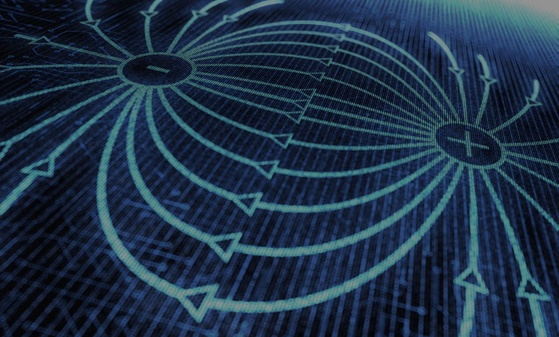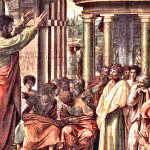The Absolute Simplicity of Unconditioned Reality
by Karlo Broussard
Filed under The Existence of God
NOTE: Today we continue our six-part series by Karlo Broussard on a metaphysical proof for God's existence. The posts will run each of the next five Mondays:
- Part 1 - Why Must There Be at Least One Unconditioned Reality?
- Part 2 - The Absolute Simplicity of Unconditioned Reality
- Part 3- The Absolute Uniqueness of Unconditioned Reality
- Part 4 - The Key Divine Attributes of the Absolutely Unique and Simple Unconditioned Reality
- Part 5 - Key Attributes: Perfection the Three Omnis
- Part 6 - Important Features of the Metaphysical Proof
We have seen in the previous post on the metaphysical argument for God’s existence that at least one unconditioned reality must exist in all of reality—a reality that is necessary to ground the existence of any conditioned reality (what one might call a “Creator”). We concluded by asking whether unconditioned reality is worthy of what theists have traditionally defined as God—namely the supreme being that is absolutely simple (pure being or pure existence) and unique, immutable, immaterial, eternal, perfect, personal, all-powerful, etc.
It is my intention to take up the metaphysical principle of absolute simplicity in this post. Drawing heavily again from Fr. Robert Spitzer’s book New Proofs for the Existence of God: Contributions of Contemporary Physics and Philosophy, I will first explain the metaphysical sense of absolute simplicity and then reason to the conclusion that unconditioned reality considered in and of itself must be absolutely simple. This will set the stage for future posts in which I will discuss the various attributes that we can deduce from our knowledge of unconditioned reality and its absolute simplicity.
The first step for understanding this metaphysical idea of absolute simplicity is to think about how the realities of our experience are restricted to particular modes of being. They have distinguishing notes or diversifying principles that makes them this being instead of that being. These distinguishing notes or diversifying principles constitute what philosophers call restrictions or boundaries. Such restrictions can be spatial (X exists here instead of there), temporal (X exists now instead of then), or a way of existence (X exists and behaves in this way, the way of an electron for example, instead of that way, the way of a proton—this is called “essence” in Scholastic jargon).
Now, it’s important to note that such restrictions (or boundaries) cause exclusion between existents and make for incompatible states of being. Take for example the proton and the electron. The restricted way of behaving like a proton (the attraction of electrons) excludes and is incompatible with the restricted way of behaving like an electron (the repulsion of electrons)—in other words the proton is not going to act and behave like the electron in the same respect at the same place and time. They are incompatible states of being—the proton exists and behaves in this way as opposed to that way (the way of an electron) and the electron exists and behaves in this way as opposed to that way (the way of a proton).
Moreover, even though two existents may exist in the same way (i.e., have the same essence), they still can be separated or excluded from one another due to spatial or temporal restrictions. For example, if proton A exists here, then proton B is excluded from proton A because it cannot exist in the same spatial point at the same time (spatial restriction). If proton A exists now but proton B existed then, then obviously proton A would be excluded from proton B because proton B no longer exists while proton A does (temporal restriction).
So, in short, restrictions (or boundaries) exclude and make for incompatibility.
The second step for understanding absolute simplicity considers how some realities are less exclusive and more compatible with other modes of being and consequently have fewer restrictions that limit their mode of existence (i.e., less boundaries). Take for example, as Fr. Spitzer does in his book, the electromagnetic field, the medium through which protons and electrons interact. What if that field had the existential restrictions of an electron—that is to say it existed in the electron way and not the proton way? Obviously the protons would not be able to interact with it because they would be excluded by and incompatible with the field’s electron restrictions. What if the electromagnetic field had the existential restrictions of a proton? Similarly, the electrons would not be able to interact with it because they would be excluded by and incompatible with the field’s proton restrictions. But the protons and electrons do interact with the electromagnetic field. Therefore, the electromagnetic field is compatible with both the restrictions of the proton and the restrictions of the electron. It is less exclusive and more inclusive.
What this means is that the electromagnetic field must have fewer restrictions (or boundaries) in its mode of existence. Why? Because restrictions cause exclusion and incompatibility; thus less exclusion and more compatibility means fewer restrictions. Since the electromagnetic field is less exclusive and more compatible than protons and electrons, it follows that it has fewer restrictions that limit its mode of being—metaphysically speaking it’s simpler in nature (higher level of simplicity) than protons and electrons.
So, we have arrived at an important metaphysical principle: the less exclusive and more compatible a thing is with other realities, the fewer restrictions it has to limit its mode of being (less boundaries)—that is to say the simpler it is.
In light of this, we can ask for step three, “What would an absolutely simple being be like?” Well, since the simplicity of a thing is proportioned to the degree of restrictions that limit its mode of existence, it follows that a reality that is absolutely simple would have no restrictions whatsoever to limit its act of being. In other words, it would be totally unrestricted in its act of being—not being restricted to existing in this way or that way; nor being restricted to existing here instead of there; nor being restricted to existing now instead of then; but simply be pure existence or pure being itself (the scholastic jargon is "Pure Actuality" since something is in act in as much as it exists). Consequently, such a reality would be totally compatible with and inclusive of any real or possibly real mode of being. Nothing would (or could) be excluded from it because it would have no restrictions to give rise to exclusion or incompatibility.
Now that we have explained what absolute simplicity is in the metaphysical sense, we are in a position to move to the question, “Is unconditioned reality, considered in and of itself, absolutely simple or pure being itself?”
We can start with the following idea: Any reality X that has restrictions (thus limiting its mode of being to existing in this way and not that way; or existing here instead of there; or existing now instead of then, i.e., not absolutely simple) is going to have a real or really possible incompatible state (i.e., a not X) on the same level of simplicity. For example, it’s the restrictive existence of the proton that allows for the real possibility of the incompatible state of the electron (as well as neutrons and perhaps a billion of other possible other types of particles). Similarly, the restrictive existence of the electromagnetic field allows for the real or real possibility of the incompatible state of other kinds of fields, such as the neutrino field, the gravitational field, the quark field, and the electron field. So, the question of whether unconditioned reality itself is absolutely simple is really a question of whether unconditioned reality itself can have any real or really possible incompatible states of being on the same level of simplicity (like the protons and non-protons; like the electromagnetic field and non-electromagnetic fields). The answer to such a question is no.
Let’s say for argument sake that unconditioned reality was reality “X” and due to its restrictions it had a real or really possible incompatible state of being, “not X,” on the same level of simplicity. Since restrictions cause exclusion and incompatibility, the real or really possible state, “not X,” would be incompatible with and thus exclude from itself the only thing that can ultimately fulfill the conditions for its existence, namely unconditioned reality (see the previous post). But if this incompatible state of being, “not X,” would exclude from itself and be incompatible with the only thing that could ultimately fulfill its conditions for existence, namely unconditioned reality, then it could not in principle be real or really possible—i.e., it couldn’t exist or even possibly exist.
For example, if unconditioned reality had the restrictive mode of existence of a proton, then unconditioned reality would be incompatible with an electron and consequently the electron would be excluded from unconditioned reality (remember protons and electrons are incompatible states of being due to their existential restrictions or boundaries). Now, if the electron was excluded from unconditioned reality, then the electron could not exist because it would be excluded from the only condition that is sufficient for its existence (remember every conditioned reality has its conditions fulfilled ultimately by unconditioned reality). The same reasoning applies if we reverse the roles and postulate unconditioned reality having the restrictions of an electron in which case protons could not exist.
A similar outcome would ensue if unconditioned reality was restricted to a position in a spatial manifold or a point in a temporal manifold. Consider for example unconditioned reality existing in a spatial position that an electron or a proton was not. In such a case that electron or proton could not have its conditions fulfilled (and thus not exist) because unconditioned reality would be unable to interact with it in order to fulfill its conditions. If unconditioned reality existed at a point in time when a particular electron or proton did not, then obviously that electron or proton would never have its conditions fulfilled and would be nonexistent.
So, we can see how if unconditioned reality had any restrictions that would give rise to any real or really possible incompatible state of being on the same level of simplicity then that state of being could not exist—it could not be real or really possible.
If one has “eyes to see and ears to hear,” the hypothesis that unconditioned reality can have a real or really possible incompatible state of being on the same level of simplicity is an intrinsic contradiction. Think about it in light of what we have proven so far: If unconditioned reality has a real or really possible incompatible state of being on the same level of simplicity, then such a state of being could not have its conditions fulfilled—i.e., it could not in principle be real or really possible. So what we have here is the following: if restriction in unconditioned reality, then a real or really possible incompatible state of being on the same level of simplicity that cannot be real or really possible. This obviously is a contradiction and thus cannot be true. Therefore, unconditioned reality cannot be any reality that would have a real or really possible incompatible state of being.
Now, if unconditioned reality cannot have any real or really possible incompatible state of being on the same level of simplicity, then it cannot have any restrictions (or boundaries) that would limit its mode of being to existing in this way instead of that way; or here instead of there; or now instead of then. Why? Remember, if restrictions, then incompatibility – no incompatibility, therefore no restrictions. If unconditioned reality itself has no restrictions to its mode of being, then nothing (whether real or really possible) can be excluded from it, which means that it must be compatible with and inclusive of all other real or really possible restricted states of being. In other words, unconditioned reality must be pure being itself or pure existence itself without any restrictions whatsoever to its act of existence – in short it must be absolutely simple.
The questions remain whether there can be only one unconditioned reality and whether it has the divine attributes classically ascribed to God. I will take up the absolute uniqueness of unconditioned reality in the next post.
Related Posts
Note: Our goal is to cultivate serious and respectful dialogue. While it's OK to disagree—even encouraged!—any snarky, offensive, or off-topic comments will be deleted. Before commenting please read the Commenting Rules and Tips. If you're having trouble commenting, read the Commenting Instructions.













